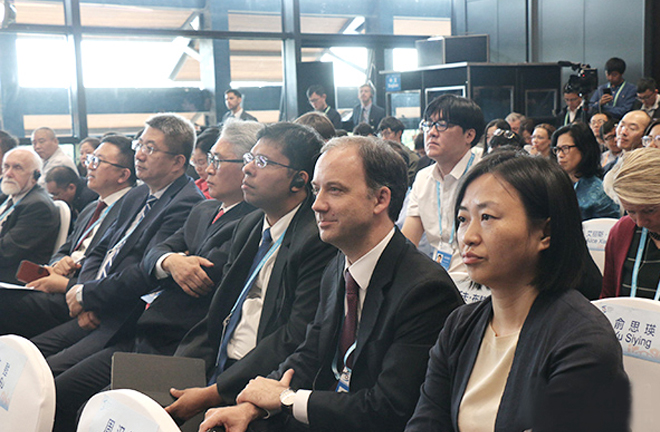Scholars shed light on data protection legislation

Scholars at the Forum of Legal Protection of Data in Cyberspace Photo: Wu Nan/CSST
Wuzhen—As a sub-forum of the Sixth World Internet Conference, the Forum of Legal Protection of Data in Cyberspace was hosted by the Chinese Academy of Social Sciences (CASS) on Oct. 20. Scholars at home and abroad conducted in-depth dialogues on international conventions on the legal protection of data, Chinese experience in the legal protection of data, data privacy protection in the era of artificial intelligence, the legalization of data governance, the enactment of civil codes and the construction of data rights systems.
More and more people understand the world, disseminate information, exchange ideas and start businesses through the internet. However, the massive quantity of network data generates both value and potential dangers. Reducing cyber security risks, preventing the leakage and abuse of personal information, and balancing between data security and data development have become common challenges facing global internet governance.
Gao Peiyong, vice president and a CASS Member, said that it is necessary for the international community to cooperate to promote the legalization of data governance, especially to maintain data security. We should uphold the concept of a community of shared future in cyberspace proposed by Chinese President Xi Jinping, and establish international rules for data governance that are acceptable to all parties. As to China’s rule of law in cyberspace, it is necessary to speed up the development of special laws regarding the internet such as a personal information protection law and accelerate the enactment of supporting provisions of the Network Security Law and the Electronic Commerce Law.
Zhou Hanhua, deputy director of the Institute of Law at CASS, said that Xi’s “four principles” to promote the reform of the global internet governance system and the “five points” to build a community of shared future in cyberspace have already become an international consensus. The Institute of Law at CASS has established the first research entity for network information law in China, hoping that more institutions will participate in studying the rule of law in China’s information network in the future.
Viacheslav Sevalnev, deputy director of the Institute of Legislation and Comparative Law under the Government of the Russian Federation, said that the widespread use of information and communication technologies has expanded the regulatory scope of international law. When making laws and regulations on communication and information technologies, it must be considered not only from the national level but also from the international level. A universal international treaty should be drawn up within the member states of the United Nations to establish an international legal system for personal data protection. Countries would implement the treaty according to their own wishes and actual conditions.
David Alfred, chief counsel of the Personal Data Protection Commission (Singapore), introduced Singapore’s approach to trusted data sharing and data governance. The Personal Data Protection Act provides Singapore with a good legal basis for personal data protection, and the act also initiates a comprehensive framework for trusted data sharing. Alfred suggested establishing an ethics advisory committee of artificial intelligence data to develop research plans and frameworks for the use of artificial intelligence.
edited by YANG LANLAN

 PRINT
PRINT CLOSE
CLOSE